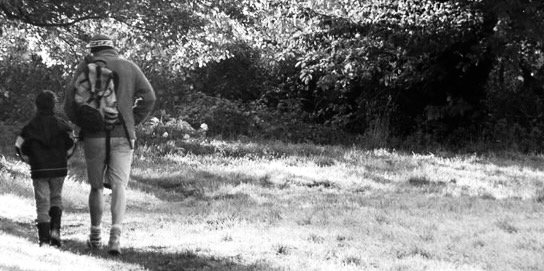
In my experience as a people-helper, I have come to believe that the solutions people seek are emenant, right there, already in their possession, or being actively extended to them by God. It’s just a matter of recognizing them. It felt like this was the general approach Sam would take, so we met (on-line) for the first time a couple of weeks later.
After some preliminary storytelling and clarifying questions from Sam, we just hopped right into the therapeutic deep end: childhood. Like I had done with panic attacks, I internally rolled my eyes a bit. Not because I think inner-child work is stupid or unhelpful but because I was convinced I had “completed” my own inner-child work. I had looked deeply into the pathologies of my family of origin, I had confronted the abuse, cherished the blessings, named the players and labeled the outcomes. I had graduated from inner child work…right?
I looked around at a lot of spiritual people I admire and how they seemingly move through life without wallowing around in memories of their 7th birthday party when no one came, or being laughed at in the middle school locker room. As of this writing, I don’t know if that’s true of these other people. Maybe they did graduate. Maybe they are in denial. Maybe there are other possibilities. But I can say that what’s changed is: I’m learning to stop comparing.
So, regardless of my relative “therapeutic maturity” I found myself sharing the story of the “child voice” which guided me out of trouble, then listening to Sam eagerly connect that experience to the bigger ideas surrounding childhood traumas (both capital T traumas and lower case t traumas).
In that first session, Sam layed out the theory that, like most men in our culture, my understanding of and ability to experience and maintain joy was never developed. This is critical because, as the thinking goes, we were made by God to live in joy, it’s our default state. The Fall, of course, means that there will be significant challenges in doing so, but for the follower of Jesus, through His work, we can “return to joy”. That phrase will be a core theme.
But as it relates to my childhood (and without regurgitating my therapy sessions in total here) we popped the bubble of my current struggles with this idea:
At key developmental points in my life, I was either presented with a corrupted concept of joy, made to feel ashamed or afraid of real joy, or I was denied joy altogether. This condition solidifies over decades into a pathology (well, one might say a “personality”.) It seems that the accumulated losses of the last couple of years served as pile of dry wood and the crisis at Mt. St. Helens was the spark. What burned down was that “personality”: the amalgamation of ideas, behaviors and practices that I have cobbled together to navigate a world in which I’m MADE for joy, but I don’t/can’t access it. Without that set of coping tools…I kind of collapsed.
Our entire culture has at its center this paradox, and it’s mostly balanced on the shoulders of men. For a breathtakingly profane but equally precise snapshot of this culture, watch THIS. So it seems there is the Universal joy problem from which we all suffer, a Cultural joy problem from which most of us (especially men) suffer, and then my own Individual joy problem.
All of this resonated with me, and toward the end of our first session it deeply informed an exercise Sam lead me through in which I imagined being in the presence of Jesus and he looked on me with delight. My job was simply to feel it…joy…and joy is: Knowing that someone bigger and stronger than you, delights in you because you’re weak.
Mind blow.
💗